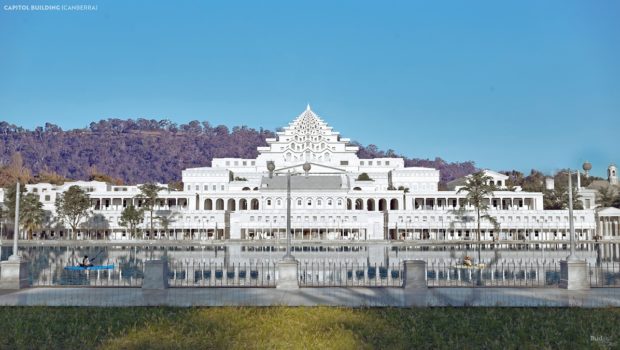A city’s skyline is one of its most iconic features when it comes to attracting new businesses and tourists, but it’s not a permanent fixture, because it only takes one change to completely change how a city looks. Iconic new skyscrapers are appearing in cities all around the world even now, while older buildings that once dominated are either torn down or overshadowed by bigger, bolder landmarks. But how about those that were never built in the first place?
For every stunning building that has been created, there are many more that never quite make it off the drawing board, which could have completely changed the way we look at the areas they would have inhabited. To demonstrate this, here’s five Australian cities with an epic building finally brought to life:
Perth
The New Norcia Cathedral and Monastery wouldn’t have actually been built within Perth’s city limits, but instead around 90 minutes outside them, in a town called New Norcia. That’s where the order of St Benedict live and in the 1950s they decided to raise their profile by building a stunning new cathedral and monastery that would draw people to the area. It certainly would have done that, but at 800,000 dollars it was just too expensive and was never built.
Canberra
Walter Burley Griffin and Marion Mahony Griffin had a very unusual honeymoon in 1911. The newlyweds from Chicago, USA, spent at least some of it designing a new Australian capital, including a striking-looking ziggurat-shaped Capitol Building. They won the design competition and looked set to bring their plans to life in Canberra, but funds ran short and the Griffins and their plans eventually departed.
Melbourne
Poor Walter Burley Griffin had similar luck with a ziggurat design in Melbourne, this time for the Jolimont railway yards. This building otherwise looked very different to the Canberra Capital Building design, a long and twisting station in between the rail tracks and the river, which he entered into a 1925 design competition. This time his plans didn’t even clear the first hurdle as he was beaten by James Smith.
Sydney
Few cities have as iconic a skyline as Sydney, but one aspect of it that could have been very different is the Legislative Assembly. In 1861 there was a design competition that Irish architect William H. Lynn entered with a gothic plan that wasn’t a million miles away from Hogwarts, complete with “a succession of lofty towers, including a campanile… and a high-pitched roof and windows [that were] highly ornamented.” Unfortunately, it failed to cast a spell over the authorities and wasn’t built.
Brisbane
Did you know that the biggest cathedral in the world is in Brisbane? You didn’t know that, because it isn’t, but it could have been. The planned Holy Name Cathedral would have cost a million dollars in 1928 and certainly looked a million dollars, with room to fit in 4,000 worshippers and a Renaissance design that would have made it looked much older than it was. But the Great Depression meant that such extravagance had no chance of being brought to life.
Now that you’ve seen them, which of these designs is your favourite?
The post How 5 Australian Cities could have Ended Up Looking appeared first on YourAmazingPlaces.com.
from YourAmazingPlaces.com https://ift.tt/35dUlMW


















0 comments:
Post a Comment